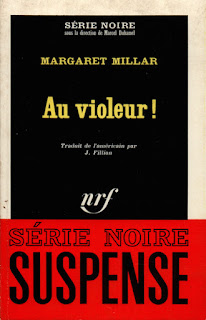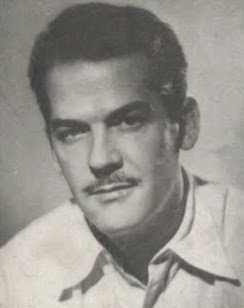This Necessary Murder
Frances Shelley Wees
London: Jenkins, 1957
191 pages
When buying this book I chose to ignore several significant clues: This Necessary Murder is the only Frances Shelley Wees novel that did not attract a North American publisher. The Jenkins edition was limited to a single printing. There has never been a paperback.
It begins:
Jane Merrill (our young Jyne, as Patch the gardener called her), ran joyfully down the broad polished stairs her brother Jonathan's ancient Toronto house and flung open the door. The birds were out of their minds with excitement over the fat worms hastily digging themselves underground on the dewy lawn, and the great variety of perfectly wonderful spots for new one-room homes. The air was heavy with flowers, budding leaves, new grass...My heart sank.
Before reading those words, I'd hoped This Necessary Murder might make it as a Ricochet Book, the Véhicule Press imprint for which I serve as series editor.
And why not?
I'd liked the author's previous mystery, The Keys of My Prison, going to far as to liken it to the domestic suspense and psychological dramas of the great Margaret Millar. Ten months after reading the novel, The Keys of My Prison was back in print as a Ricochet Book.
This Necessary Murder isn't nearly so strong a work, but it's also not quite as awful as its publishing history and opening scene suggest.
Our young Jyne or Jane (we never do encounter Patch the gardener) is twenty-four years old. A single woman of indeterminate means, she lives with and dotes on her much older bachelor brother, renowned specialist in criminal psychology Doctor Jonathan Merrill. Dutiful Police Constable Henry Lake, “Jonathan’s extra right arm,” also lives in the ancient Toronto house, though this is a temporary arrangement.
Read nothing into Jonathan’s bachelorhood.
Backstory informs that the doctor has recently put his skills to use in taking down the notorious Barnes Gang, and was shot through the shoulder for his efforts. Now, with leader Jed Barnes and the rest of his gang locked away in the Don Jail, the threat posed to the small Merrill household appears over. Henry Lake stays on only to care for Jonathan as he recovers from his shoulder wound.
You know, instead of a nurse or Jane or Patch the gardener.
The morning of the fat worms brings a letter from Allie March, wife of Jonathan’s old college friend Danny:
We need Jon in Tressady just now. We have an odd little problem… an emotional business, nothing more. I wish Jon could come but I don’t dare write him. It’s only a small storm in a Wedgwood teacup, but there are possibilities of the sort of unpleasant gossip and long-term suspicions that are bad for a small town.Justice being swift in This Necessary Murder, Jon isn’t able to help because he has to stay in Toronto to testify at the Barnes Gang trial. He suggests Jane go in his place:
“Me? In your place? Are you out of your mind?”Again, justice is swift in This Necessary Murder; investigation, on the other hand, moves at the pace of a particularly fat worm.
“Quite sane. You have often acted as an observer for me before now. You could see what is troubling Allie… send me reports… get out of the city as you wish to do, and as soon as I am free I will come.”
“How long will that be?”
“Not long, I think,” Jonathan said quietly.
But is there really anything to investigate?
The small storm in a Wedgwood teacup is being caused by Bill Edwards, the fiancé of Ann Elliott, small town dress-designer and heiress to a family fortune built on the lumber industry. It is assumed that the two would’ve wed by now had it not been for the recent deaths of Ann’s mother and sister. The old lady – well, she was in her fifties – died of heart failure. The sister, Myra, followed a few months later during a Toronto shopping spree. A vain asthmatic with an allergy to just about everything, she was discovered dead in her car smelling of a perfume she'd been advised to avoid. At the time, no one thought anything suspicious about either death, but Bill has begun to suggest that both women were murdered.
Before Jane has the chance to do much investigating, the body of a real estate agent named Marina Thorpe is found just outside the gates of the Elliott estate. Jonathan and Henry Lake fly in from Toronto and things get strange.
Jonathan holds sway over the investigation... but why? Sure, he's worked with law enforcement in the past (see: Barnes, Jeb), but the doctor isn't in the employ of any law enforcement agency. As a Toronto Police constable, Henry Lake is well outside his jurisdiction. And yet, the Ontario Provincial Police allow both free rein. Meanwhile, Jane steals what she believes to be evidence from an innocent woman, and then accompanies Jonathan as he removes articles from murder victim Marina Thorpe's hotel room. In doing so, the doctor learns that the OPP sergeant standing guard has a pass key, and so asks him to keep watch as he goes through a room belonging to a man is known to have spoken to the murdered woman:
The sergeant looked at him sharply. “I got no orders, Dr. Merrill.”Idiots!
“Nor have I. We are definitely out of bounds. But I think that under the circumstances we could be allowed the latitude.
“Well you wouldn’t do no harm,” the sergeant agreed.
"What right have you big-shot snooping outsiders got to come here and show up the regular officers?" says the murderer, when caught. "A smart-alecky girl... an armchair thinker with his arm in a fancy black sling, a tin-horned cop with a notebook... and how do you think our Provincial men are going to look, going into court with all the credit going to you?"
Good questions. Of course, Jane, Jonathan, and Henry have no right at all. The Provincial men won't look at all good. What's more I'm betting that the evidence Jane and Jonathan collected will be thrown out of court.
And so, This Necessary Murder joins Wees's Where is Jenny Now? in being considered and rejected as a Ricochet Book.
Next up: M'Lord, I Am Not Guilty.
Here's hoping it's better than its title.
Most boring sentence:
The day moved on.Most boring passage:
Bill Edwards, Allie and Danny had gone to Ann Elliott's. Jonathan had called Henry Lake to give him the news of Jed Barnes, and Henry had said at once that he would like to come in and see Jonathan, if suitable replacements could be found for him. There had been two more reporters, he said, and in any case Miss Elliott had been shut up in her room most of the day, alone, and it might be that she would soon waken and wish for company. There had been a special note in his voice that Jonathan recognized. So Allie and Danny had been encouraged to go out there, and Bill had insisted on going too.
More trivia: Ottawa is spelled "Ottowa." I blame the British editor.
Still more trivia: The Herbert Clarence Burleigh fonds at Queen's University features a good amount of writing on Wees, including "MURDER IN MUSKOKA," a piece on This Necessary Murder clipped from the Toronto Telegram. Sadly, the fonds do not record the date, nor the writer, nor the artist who contributed this illustration:
The anonymous hand behind "MURDER IN MUSKOKA" writes that "This Necessary Murder starts out in Toronto and moves to Muskoka" (the novel places Tressady as being north of Toronto, but gives no specific location). Jonathan Merrill is described as a psychologist who lectures at the University of Toronto (something not mentioned in the novel). According to this same anonymous hand, Wees has confirmed that the Boyd Gang inspired the Barnes Gang (which plays a role only in the backstory). She reveals that Jonathan Merrill is modelled on a "Toronto public relations man (who is in on the secret)."
Object and Access: A compact hardcover in pristine dust jacket. The rear flap features an advert for The Keys of My Prison. I purchased my copy of This Necessary Murder from bookseller Stephen Temple this past summer. He was kind enough to knock off a few dollars from the asking price.
As of this writing one – one – copy is listed for sale online. Jacket-less and ex-library, it's being offered at $17.50 by a Chatham bookseller. It may well be worth the price.
Library and Archives Canada, the University of Calgary, and the University of Victoria have copies. C'est tout.
Despite disinterest from the Americans and paperback houses on both sides of the pond, the novel was published in German translation: Der Duft von Permaveilchen (Munich: Goldmann, 1962).
Related posts:


























































